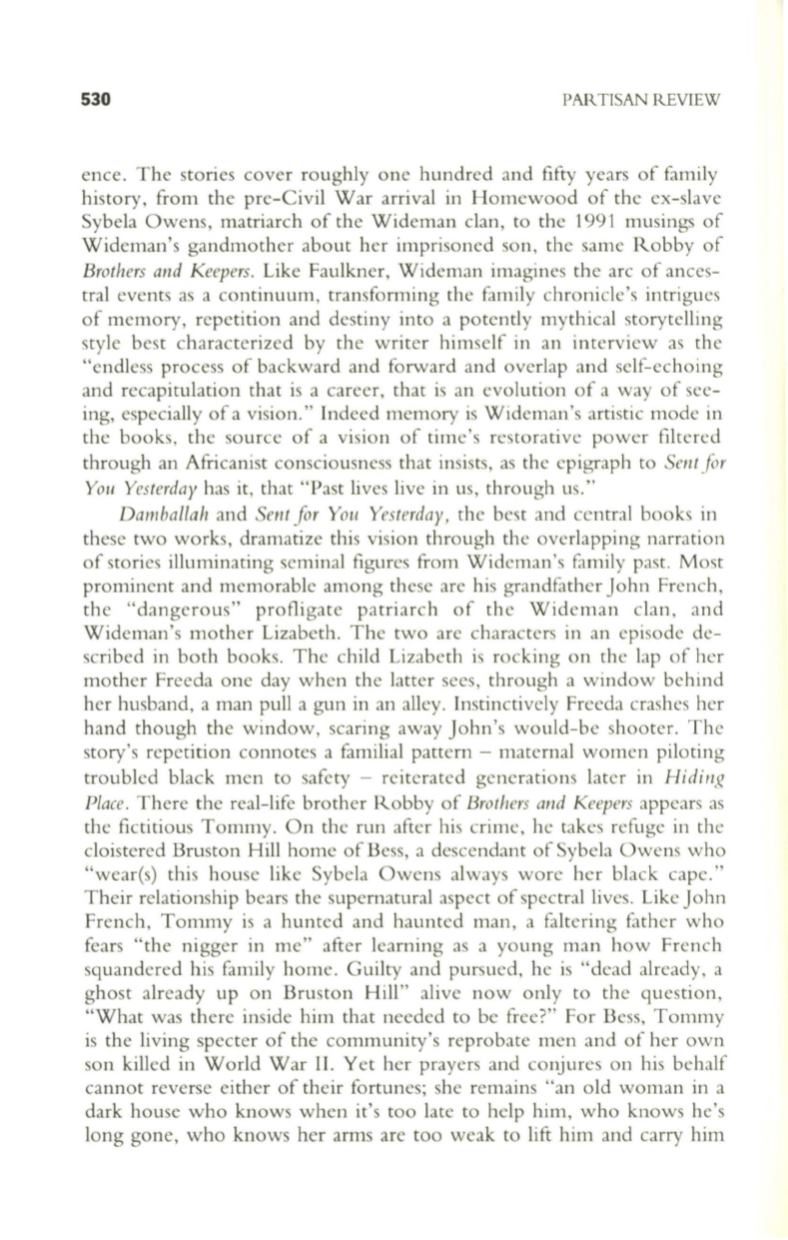
530
PARTISAN IliVIEW
ence. The stories cover roughly one hundred and fifty years of family
history, from the pre-Civil War arrival in Homewood of the ex-slave
Sybela Owens, matriarch of the Wideman clan, to the 1991 musings of
Wideman's gandmother about her imprisoned son, the same Robby of
Brothers and Keepers.
Like Faulkner, Wideman imagines the arc of ances–
tral events as a continuum, transforming the family chronicle's intrigues
of memory, repetition and destiny into a potently mythical storytelling
style best characterized by the writer himself in an interview as the
"endless process of backward and forward and overlap and self-echoing
and recapitulation that is a career, that is an evolution of a way of see–
ing, especialJy of a vision." Indeed memory is Wideman's artistic mode in
the books, the source of a vision of time's restorative power filtered
through an Africanist consciousness that insists, as the epigraph to
Smt Jar
You Yesterday
has it, that "Past lives live in us, through us."
Damballah
and
Sent Jar You Yesterday,
the best and central books in
these two works, dramatize this vision through the overlapping narration
of stories illuminating seminal figures from Wideman's family past. Most
prominent and memorable among these are his grandfather John French,
the "dangerous" profligate patriarch of the Wideman clan, and
Wideman's mother Lizabeth. The two are characters in an episode de–
scribed in both books. The child Lizabeth is rocking on the lap of her
mother Freeda one day when the latter sees, through a window behind
her husband, a man pull a gun in an alley. Instinctively Freeda crashes her
hand though the window, scaring away John's would-be shooter. The
story's repetition connotes a familial pattern - maternal women piloting
troubled black men to safety - reiterated generations later in
Hiding
Place.
There the real-life brother Robby of
Brothers and Keepers
appears as
the fictitious Tommy. On the run after his crime, he takes refuge in the
cloistered Bruston
Hill
home of Bess, a descendant of Sybela Owens who
"wear(s) this house like Sybela Owens always wore her black cape."
Their relationship bears the supernatural aspect of spectral lives. Like John
French, Tommy is a hunted and haunted man, a faltering father who
fears "the nigger in me" after learning as a young man how French
squandered his family home. Guilty and pursued, he is "dead already, a
ghost already up on Bruston Hill" alive now only to the question,
"What was there inside him that needed to be free?" For Bess, Tommy
is the living specter of the community's reprobate men and of her own
son killed in World War
II.
Yet her prayers and conjures on his behalf
cannot reverse either of their fortunes; she remains "an old woman in a
dark house who knows when it's too late
to
help him, who knows he's
long gone, who knows her arms are too weak
to
lift him and carry him


